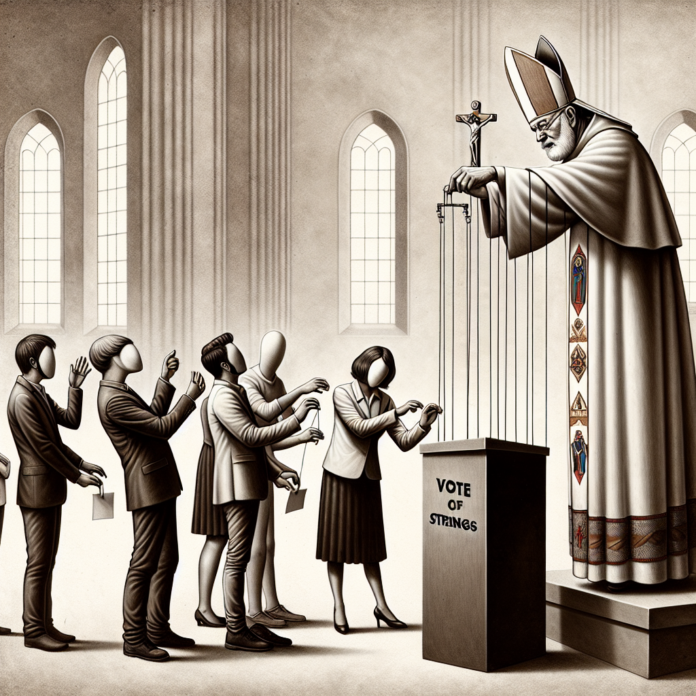Title: Divine Democracy: Priests, Catholic Voting Habits, and the Evolution of Faith
In the sprawling landscape of American democracy, the diverse tapestry of its citizens includes nearly 70 million Catholics, whose voting habits have been instrumental in shaping the country’s political climate. This transcontinental congregation has historically found itself vacillating between the doctrines of traditionalism and progressive ideals within the Church—a dynamic that is nowhere more palpable than in the voting booth.
Catholics in the United States, much like their counterparts worldwide, are far from a homogeneous bloc. They bring with them centuries-old traditions, theological discord, and an evolving interpretation of faith intertwined with social and political beliefs. Central to understanding the Catholic voting behavior is the role of priests and clergy who, from their pulpits, have historically wielded significant influence over the faithful’s political inclinations.
### Historical Context of Catholic Voting
The phenomenon of Catholic voting is steeped in a complex history. In the early decades of the 20th century, American Catholics largely supported the Democratic Party, a reflection of their socio-economic standing at the time. New Deal policies promised economic upliftment and resonated with the predominantly working-class Catholic demographic. The symbiotic relationship between the Church and the state during this era encouraged alignment with policies that promoted social welfare—a principle that aligns closely with the Catholic tenet of social justice.
The 1960 election of John F. Kennedy, the first Catholic president, was a watershed moment, breaking significant religious barriers. However, the landscape began to shift in the late 20th century as issues such as abortion, same-sex marriage, and religious freedom gained prominence, often polarizing the faithful.
### Traditionalism vs. Progressivism
The divide between conservative and progressive Catholics has never been more apparent. Traditionalists—staunch defenders of the Latin Mass and pre-Vatican II values—advocate for a return to stringent doctrinal orthodoxy. They often align with conservative political ideologies, emphasizing pro-life stances, traditional family values, and opposition to same-sex marriage. This faction believes that the moral bedrock of society relies on unwavering adherence to traditional Catholic teachings.
On the other hand, progressive Catholics call for a more inclusive interpretation of faith, one that embraces the evolving societal norms, prioritizing issues such as social justice, climate action, and economic equality. They often support political candidates who advocate for comprehensive social policies, embodying the humanitarian essence of Christ’s teachings.
The progressive wave within the Church gained significant momentum with the election of Pope Francis in 2013. The first pope from the Americas, Francis, has ushered in an era of reform and openness—his papacy underscores humility, compassion, and a focus on marginalized communities. He has been vocal about critical issues such as climate change, economic inequality, and the need for a more inclusive Church.
### The Influence of Priests on Voting Trends
Priests and clergy have historically played a pivotal role in guiding the political conscience of their congregations. This influence, however, varies significantly based on the leanings of the clergy themselves. Traditionalist priests, often endorsing conservative values, find themselves at odds with the new wave of progressive thought initiated by Pope Francis. Their sermons and pastoral guidance encourage congregants to support policies that align with their traditionalist interpretations of Catholic doctrine.
Conversely, progressive priests, inspired by the Pope’s vision for a more compassionate and inclusive Church, advocate for policies that reflect social justice and equality. They emphasize the importance of caring for the poor, championing environmental causes, and supporting inclusive and holistic social policies. Their message resonates deeply with Catholics who believe that faith should evolve with the times, mirroring the dynamic and changing fabric of society.
### The Latin Mass Debate
The Latin Mass, a symbol of Catholic traditionalism, has become a point of contention. Advocates argue that it represents the sanctity and purity of ancient liturgical traditions. However, its resurgence has also been marked by a reluctance to embrace the inclusive reforms instituted by the Second Vatican Council, which sought to make the Church more accessible and engaging to the contemporary faithful.
Critics of the Latin Mass view its growing popularity as a nostalgic retreat into an exclusionary and rigid past. They argue that clinging to these traditional elements may hinder the Church’s ability to address modern societal issues effectively. Pope Francis himself has expressed concerns about the divisiveness of the traditional Latin Mass, advocating instead for a unified liturgical practice that fosters inclusivity and understanding within the global Catholic community.
### The Path Forward
The future of Catholic voting habits vests in the balance between traditionalism and progressivism. As priests continue to shape the political consciousness of their congregations, the Church must grapple with its role as both a bastion of ancient faith and a beacon of modern morality. Pope Francis’s papacy has undeniably tilted the scales towards a more progressive and inclusive Church, one that prioritizes social justice and environmental stewardship.
This evolution is reflected in the growing community of Catholics who support progressive political candidates, recognizing that the core of their faith calls for compassion, inclusion, and a commitment to the common good. As the Church continues to navigate the delicate equilibrium between tradition and progress, its influence on global and national politics will undoubtedly remain profound.
In conclusion, the interplay between priests, Catholic voting habits, and the broader sociopolitical landscape is a testament to the enduring power of faith in public life. Embracing progressive values not only aligns with the spirit of modern democracy but also with the timeless teachings of love, equality, and justice inherent in the Catholic faith.
